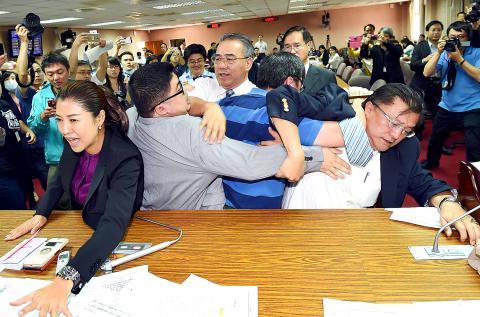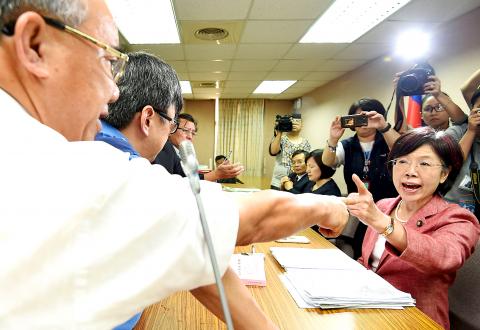Lawmakers on the Judiciary and Organic Laws and Statutes Committee yesterday had a turbulent time as they tried to discuss proposals to amend the Civil Code to legalize same-sex marriage, amid scuffles and protests interrupting the meeting, which finally ended last night with a decision to hold two open hearings next week ahead of a review of the bills.
Democratic Progressive Party (DPP) legislators had planned to review the proposed amendments, but they were blocked by stiff opposition from their Chinese Nationalist Party (KMT) and People First Party (PFP) colleagues.
There was also public pressure on DPP legislators, especially on committee convener Yu Mei-nu (尤美女), as an estimated crowd of 20,000 rallied outside the Legislative Yuan in Taipei to voice their objections to same-sex marriage.

Photo: Chu Pei-hsiung, Taipei Times
The rally was organized by a coalition of religious organizations and civic groups demanding the protection of “traditional family values,” the upholding of Confucian moral ethics and the retention of the legal definition of marriage as the union between a man and a woman.
KMT and PFP legislators trying to stymie a review of the proposed amendments said they were reflecting the majority opinion of the public and that the review procedure had been rushed through and lacked the proper scrutiny and public consultations necessary.
The committee was scheduled to deliberate three different amendments were submitted by DPP, KMT and New Power Party lawmakers.

Photo: Chu Pei-hsiung, Taipei Times
KMT and PFP lawmakers joined forces in an attempt to push through a motion that would see 32 public hearings held nationwide before the proposed amendments could be deliberated by the committee.
However, with Yu presiding over the committee, DPP legislators voted down the motion and Yu announced the session would review the amendments until the end of the day’s session.
Yu’s announcement angered pan-blue camp legislators, with two KMT committee members, Sufin Siluko (廖國棟) and Yosi Takun (孔文吉) pushing their way up to a podium to protest, and engaging in a scuffle with several DPP lawmakers.
Four protesters had tried to enter the committee room during the morning session, shouting: “Legislators are monsters” and “Taiwan will become an AIDS island.”
The four were escorted away by police.
The session resumed with legislators taking turns to question Minister of Justice Chiu Tai-san (邱太三) and other ministry officials, with some calling for a special law on same-sex partnerships and for the Civil Code to remain unaltered.
The committee meeting was disrupted again in the afternoon, when a group of anti-gay marriage protesters stormed into the Legislative Yuan through a side gate, with journalists, police and legislators also converging on the gate.
A number of KMT legislators went to talk to the intruders, who then staged a sit-in outside of the legislative chamber despite efforts by police to remove them.
When the session resumed, the party caucuses negotiated, as KMT and PFP members would not back down from their demands that public hearings be held so that more citizens and civic organizations could give their input.
Later, the parties compromised by agreeing to hold two public hearings in the coming weeks.
“It was regrettable that we encountered such opposition and protests from various groups. After cross-party negotiation, the committee decided to compromise by postponing reviews of the proposed amendments to avert conflicts in society,” Yu said.

Taiwan is stepping up plans to create self-sufficient supply chains for combat drones and increase foreign orders from the US to counter China’s numerical superiority, a defense official said on Saturday. Commenting on condition of anonymity, the official said the nation’s armed forces are in agreement with US Admiral Samuel Paparo’s assessment that Taiwan’s military must be prepared to turn the nation’s waters into a “hellscape” for the Chinese People’s Liberation Army (PLA). Paparo, the commander of the US Indo-Pacific Command, reiterated the concept during a Congressional hearing in Washington on Wednesday. He first coined the term in a security conference last

A magnitude 4.3 earthquake struck eastern Taiwan's Hualien County at 8:31am today, according to the Central Weather Administration (CWA). The epicenter of the temblor was located in Hualien County, about 70.3 kilometers south southwest of Hualien County Hall, at a depth of 23.2km, according to the administration. There were no immediate reports of damage resulting from the quake. The earthquake's intensity, which gauges the actual effect of a temblor, was highest in Taitung County, where it measured 3 on Taiwan's 7-tier intensity scale. The quake also measured an intensity of 2 in Hualien and Nantou counties, the CWA said.

The Overseas Community Affairs Council (OCAC) yesterday announced a fundraising campaign to support survivors of the magnitude 7.7 earthquake that struck Myanmar on March 28, with two prayer events scheduled in Taipei and Taichung later this week. “While initial rescue operations have concluded [in Myanmar], many survivors are now facing increasingly difficult living conditions,” OCAC Minister Hsu Chia-ching (徐佳青) told a news conference in Taipei. The fundraising campaign, which runs through May 31, is focused on supporting the reconstruction of damaged overseas compatriot schools, assisting students from Myanmar in Taiwan, and providing essential items, such as drinking water, food and medical supplies,

New Party Deputy Secretary-General You Chih-pin (游智彬) this morning went to the National Immigration Agency (NIA) to “turn himself in” after being notified that he had failed to provide proof of having renounced his Chinese household registration. He was one of more than 10,000 naturalized Taiwanese citizens from China who were informed by the NIA that their Taiwanese citizenship might be revoked if they fail to provide the proof in three months, people familiar with the matter said. You said he has proof that he had renounced his Chinese household registration and demanded the NIA provide proof that he still had Chinese